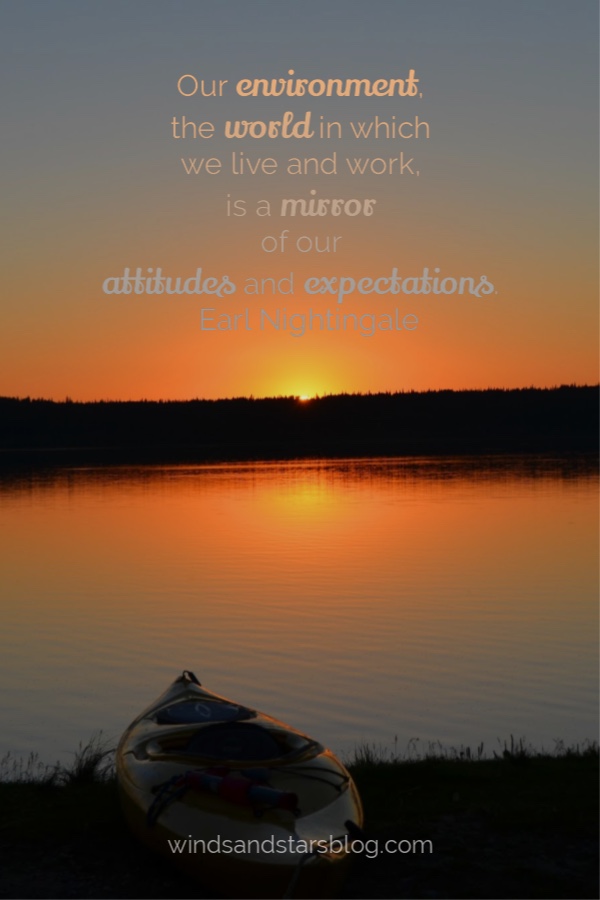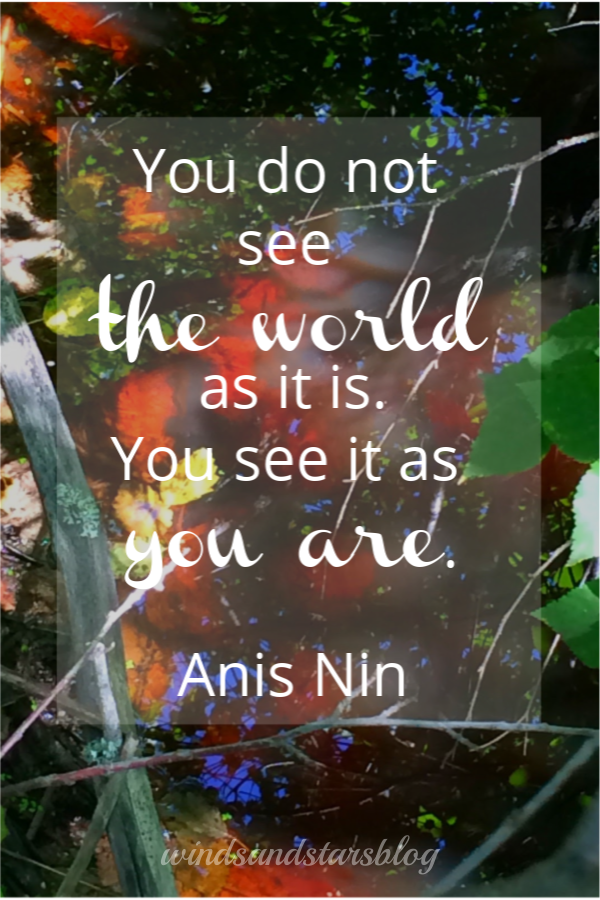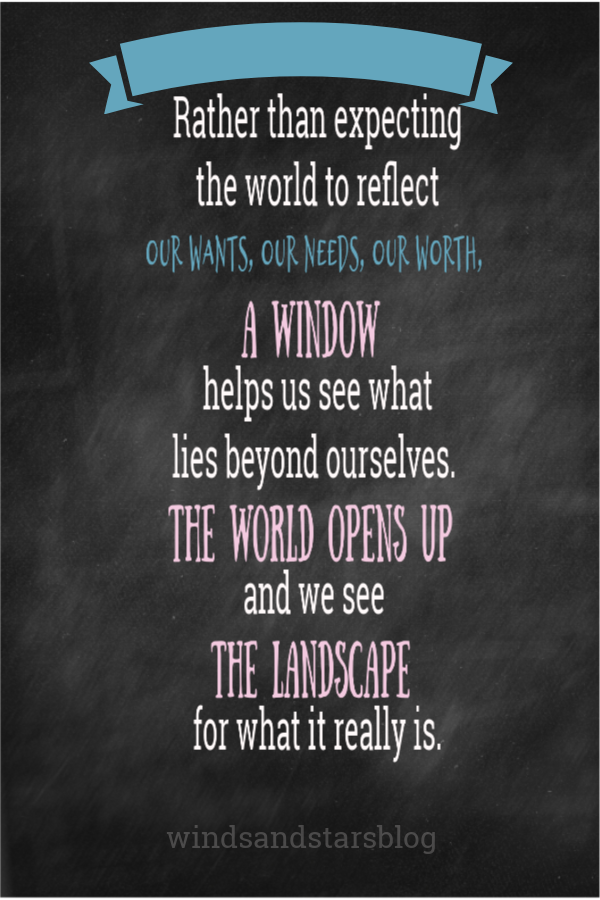Mirrors are sometimes a problem.
It was a large store. Brightly lit. Clothes hung neatly on upper and lower clothes rods with selected fashions facing outward for display.
Tables, positioned in an asymmetrical pattern, dotted the gleaming floor. Sweaters and T-shirts lay folded on them in colorful arrays. Everything competed for my attention. I looked around uncertain where to start.
Then I saw it.
A blouse hanging on the top clothes rod. It was blue. My favorite color I thought as I headed towards it. Keeping my eyes on the prize, I strode purposefully across the floor.
Bang! I walked full speed into a wall of mirrors.
Reeling from the sudden impact and feeling more than a slight flush of embarrassment, I started to laugh.
Fortunately I was shopping with two of my daughters. So while store personnel looked on in silent disbelief at the woman who walked unchecked into a wall covered in mirrors, my daughters laughed with me. Okay, they also rolled their eyes just a little.
So focused on the object of my desire, I was unaware that that it was a mirage and that the true object was behind me.
What about you? Have you walked into a wall of mirrors lately? Or ever?
Last weekend, we were sorting items in the basement. We have it set up as a kind of gym. Just as we headed upstairs my husband laughed. When I asked what was so funny, he said, “You just checked out your butt in the mirror.”
What? He noticed? I did it.
Almost subconsciously, but I did. Feeling slightly defensive, I said, “I love that mirror. It makes me look at least 20 pounds lighter”.
We all do it.
When you’re out shopping have you noticed the quick or not-so-quick glances that people make in shop windows, car windows, rear-view mirrors. We want to be visible. To matter.
Metaphorically speaking, life is a mirror.
We look for ourselves in the world. And this search goes beyond our physical image. We look outward, hoping to find acceptance and love mirrored in people’s eyes and their response to us. However, it’s problematic when we expect the world to reflect our values and beliefs.
You do not see the world as it is. You see it as you are.
Anais Nin
Mirrors distort reality – reflecting back to us what we want.
What we hope and expect to see. Often it’s a projection of our biases and prejudices. Our stereotypes rather than the reality of the world. And not recognizing the mirage, we walk head-long into a wall of mirrors.
Narcissus fell so deeply in love with his reflection that it displaced his love for Echo.
That’s what happens when our thoughts and ideas become the reflection we expect to see in the world. We lose sight of other, and we fear the diversity that makes life rich and varied and beautiful.
Mirrors, like a map, are not the territory.
Elements are missing and it’s one dimensional.
Just like maps, a mirror image is a replica, or representation. You can’t measure your reflection. I tried. It’s skewed. I was removed by distance. The closer my true self got to the mirror, the more accurate the measurement, but it still wasn’t exact.
Introspection is healthy until it becomes narcissistic.
A mirror that keeps doubling on itself and never removes ‘me’ from the picture is deceptive.
Mirror Mirror on the wall
When the evil stepmother discovered that she was no longer “the fairest in the land”, she set out to silence Snow White. Mirrors have that effect on us. We seek to silence dissenting voices. Images that don’t reflect our version of reality. Erase that which doesn’t align with our particular world view.
To always situate ourselves first and foremost into the world creates a house of mirrors that distorts.
We cannot hope to know and understand everyone’s point of view, the decisions they must make, the heartache they endure.
To project our experience and ways of coping onto others is like believing the earth is flat. It’s a mono-dimensional outlook that says my beliefs are a boundary that if stayed within will keep everyone from sailing off the edge.
Mirrors reflect the familiar.
They position us front and center. We fill the space and look to see ourselves reflected in others. And the view stops there. Sometimes we want people to reflect back our worth. Other times we want them to reflect back our values and beliefs.
But what happens when that doesn’t occur?
Does the mirror shatter? Do we build a window? Or do we continue to love our own reflection so much we have no love left for others? And thereby seek to silence dissenting voices?
Only by looking through windows can we hope to understand our world.
Rather than expecting the world to reflect our wants, our needs, our worth, a window helps us see what lies beyond ourselves. The world opens up and we see the landscape for what it really is.
A rich tapestry filled with varying and conflicting thoughts, ideals, and beliefs. We don’t need to accept them as our own. We don’t have to agree with them. But in recognizing without force that there are differences, we dance a dance of love.
Windows don’t hide the truth.
There’s an ugliness woven throughout the tapestry of life. Because we’re all imperfect, and terrible things are done. Not just in the name of evil, but also in the name of goodness and truth. Goodness and truth that becomes a club on a troubled world, rather than a hand on a hurting world.
We don’t lose ourselves in windows.
Looking through my kitchen window, I see me. My reflection.
But if I shift my gaze just a little, I see the snow-covered backyard. Beyond that smoke drifts lazily from my neighbor’s chimney. Atop one of the tall evergreens in their backyard a magpie is perched, swaying back and forth on the slim treetop. And farther still is the sky. Grey. Clouds full and ready to release more snow. I can envision the blue above the clouds. The moon. The stars. The milky way leading to universes that stretch beyond all possible imaginings.
Windows open and expand our view. They take us into the unknown and sometimes the unknowable.
Windows allow us to stretch our imaginations, perspectives, and our compassion.
Build windows. Because then you will you have a room with a view.

Yes! I want to receive your newsletter.
Simply . . .
P.S. As with all my posts, these are lessons that I’m trying to learn. To tell our stories is important but to listen to the stories of others is important as well.
P.S.S. If you read something that you think someone else would enjoy reading, please share using the buttons on the side. Thank you!




